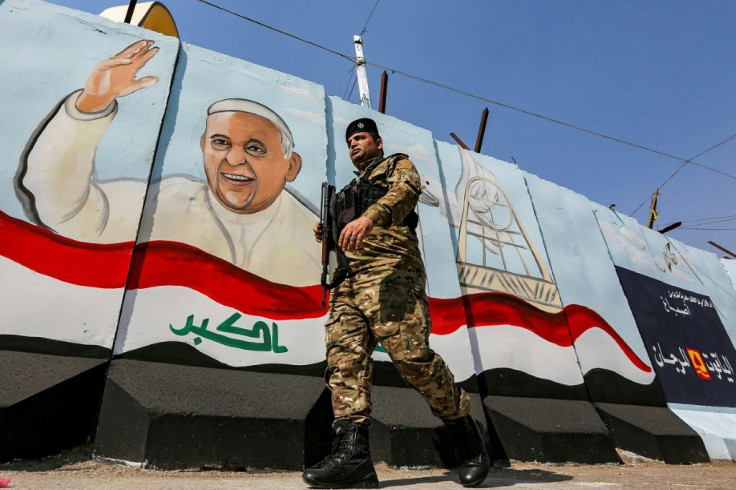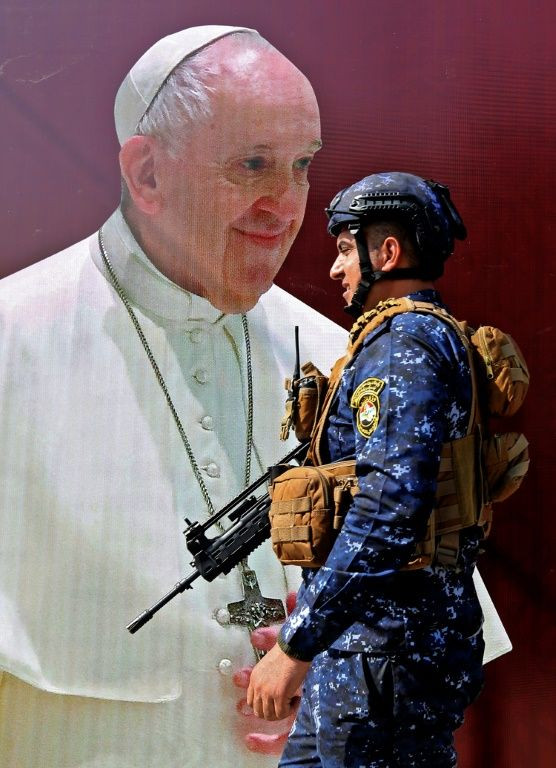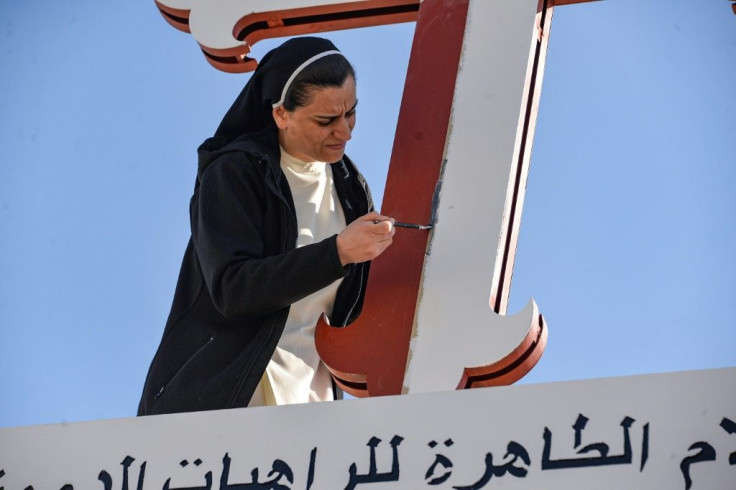Covid, Unrest: Iraqis Tackle Obstacles To Host Pope
Security threats, the Covid pandemic, war-ravaged infrastructure: Iraqis are facing major challenges as they plan to host Pope Francis later this week.
"We're very happy about this historic visit -- but it does come at a pretty difficult time," confided an official from Iraq's presidency.
Benedict XVI, who resigned as pontiff eight years ago, warned in an interview published Monday that Francis' historic visit to Iraq is "a dangerous trip for reasons of security and for the coronavirus".
A major concern has been Iraq's second wave of Covid-19, with around 4,000 new cases registered daily in the country of 40 million people.
Among those who tested positive just days before the pontiff's arrival was the Vatican's ambassador to Iraq, Mitja Leskovar.

The pope, 84, his staff and the dozens of journalists who will travel with him have been vaccinated, but no inoculation drive has yet been launched in Iraq.
To stem the spread of the virus, authorities imposed overnight curfews as well as full lockdowns on Fridays, Saturdays and Sundays, the three days of the pope's visit this week.
"The lockdown will be extended to include the entirety of the pope's visit, and security forces will be deployed to secure the streets," said Iraq's deputy foreign minister Nizar Khairallah.
Authorities have also barred travel between Iraq's provinces to keep down crowds, which are expected to be much thinner than the usual mass gatherings that welcome a visiting pope.
The prayer services he will host are ticketed events with limited seating, and church officials have told AFP they would implement strict social distancing and require all guests to disinfect regularly.

That hasn't quieted excitement for the "Baba," Arabic for pope.
Baghdad is being spruced up accordingly: church bells are being repaired, new power lines strung up and political and military posters are being replaced with colourful banners welcoming the pope.
"We wanted to fix a few things so that this historic city, this symbol of humanity, can host the pope," Baghdad mayor Alaa Maan told AFP.

Iraq has long been synonymous with conflict, and unrest has again rocked the country in the run-up to the papal visit.
Francis will cover more than 1,445 kilometres (around 900 miles) by plane and helicopter, flying directly over areas that recently saw fighting against jihadist sleeper cells.
He will visit Baghdad and Arbil, the capital of the northern Kurdish region -- both of which were shaken by rocket attacks in mid-February against Western targets.
The pope will be accompanied by members of the Swiss Guards, his personal protection force. They will be in plain clothes, not in their colourful uniforms, helmets or carrying axe-like halberds.
It was not clear if the pontiff would use his trademark bulletproof "pope-mobile", with officials refusing to comment for security reasons.
In the southern province of Dhi Qar, workers have been paving roads to the desert site of Ur, where the Prophet Abraham is said to have been born and where the pope will hold an interfaith ceremony on Saturday.
At the pyramid-like ziggurat, workers in hard-hats and neon vests are rushing to lay down wooden walkways and large parasols to create shade for the crowds expected to throng the site.
The pontiff's visit to Dhi Qar comes following deadly protests in the provincial capital of Nasiriyah where six people were shot dead in February while demonstrating against poor public services.
The pope's last full day will take him to Mosul, which was the centre of the Islamic State group's self-styled "caliphate" until its defeat three years ago, leaving the city in ruins.
Poor infrastructure could compound transport troubles for the pontiff, who has suffered from a painful bout of sciatica this year.
"The Vatican just told us the pope can't walk more than 10 steps. We're not sure what to do," said the official from Iraq's presidency.
Francis will also visit Qaraqosh, a Christian town overrun by IS in 2014, and where nuns have been climbing onto church roofs to retouch the paint on wooden crosses.
Iraqi officials, despite sleepless nights in the lead-up to the visit, say they hope the papal trip will improve the image of a country long shunned for its security, political and even health problems.
Once the pope has come and gone, predicted the Iraqi official, "foreign dignitaries will no longer be afraid of coming to Iraq".
© Copyright AFP 2024. All rights reserved.





















